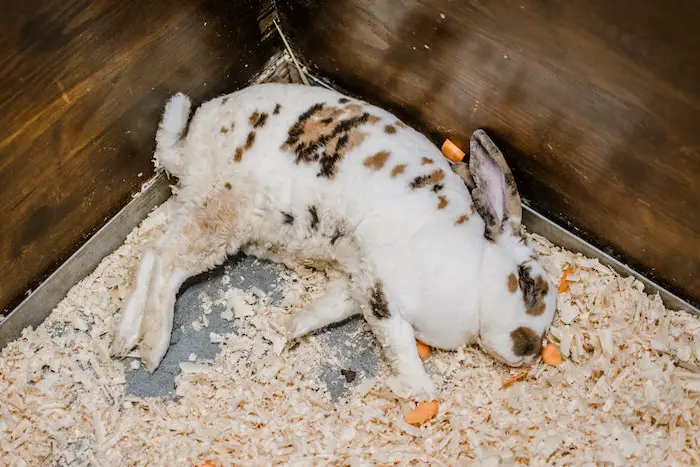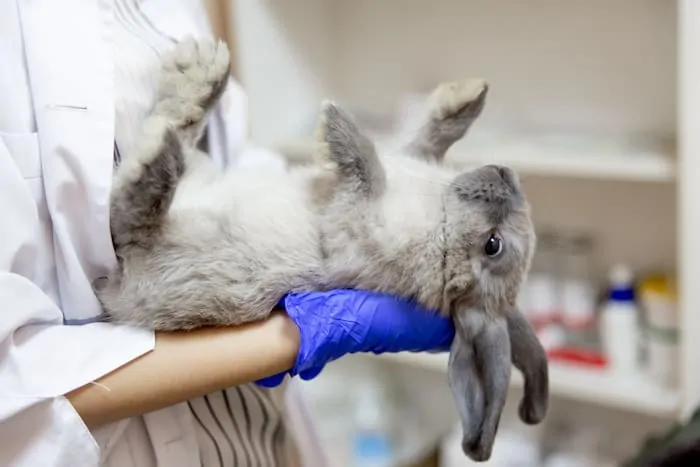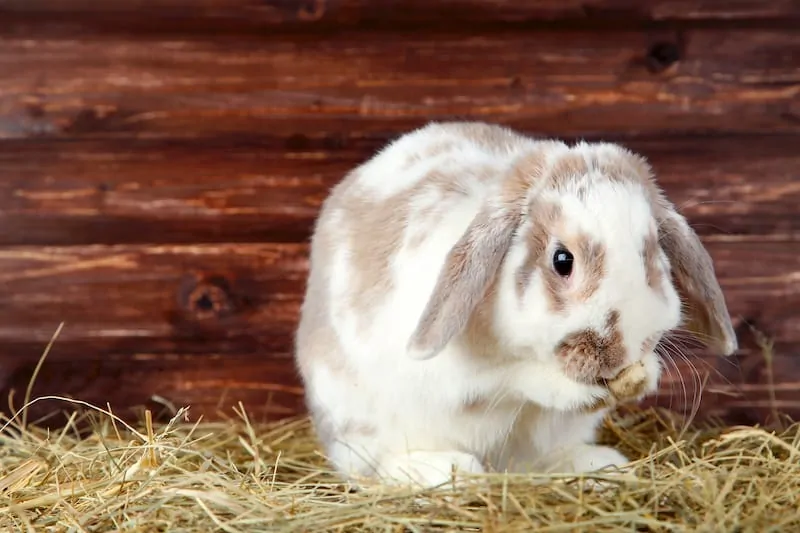We all want a rodent-free home and as such we may put certain measures in place such as rat poison in different areas of our homes. However, you may be concerned, and wonder will rabbits eat rat poison if you put it around your house? The truth is rabbits have been known to eat rat poison much to their detriment and pet owners have had to work fast. Here we will discuss rat poisoning at length including what you should look for, treatment and most importantly how to keep your rabbit safe.
Why would rabbits eat rat poison?
Rat poisons are designed to be enticing to the rats and mice that they are designed for. However, rabbits may also find them equally attractive. Also, many brands of rat poisons look a lot like the pellets that you may feed your rabbit. As such extreme caution is advised.
How can I tell if my rabbit has ingested rat poison?
Of course, you do not shadow your rabbit’s every move, so chances are if your rabbit has ingested rat poison you may not know that this has occurred.
As such it important that you know the symptoms. They are listed below:
- Blood in the urine (Hematuria) – You may see evidence on the hay in your rabbit’s cage or hutch.
- Pain or difficulty while breathing (Dyspnea) – Rabbits generally pant if they are having difficulty breathing.
- Muffled/stifled heart or lung sounds – You may need to pick up your bunny and put your ear to his chest and listen for any irregularities.
- Lethargy/Sluggish behaviour – Your rabbit may not be his usual energetic self if he has ingested rat poison.
- Depression – Your bun may take to sulking in his cage and appear reluctant to engage in his usual activities.
- Swollen joints – A gentle examination of your rabbit’s limbs may reveal abnormal puffiness.
- Pale mucous membranes – This refers to the moist tissues that line the body’s orifices e.g. the nose). These membranes are usually a rich pink. If it takes on a whitish hue, there may be a cause for concern.

Of course, if you think that your rabbit has been exposed to rat poison, take your rabbit to your veterinarian as a matter of urgency.
How long does it take for rabbits to exhibit symptoms of rat poisoning?
Rat poison does not produce symptoms in rabbits immediately. It may take numerous days for symptoms to present. It also depends on the amount of rat poison consumed and also the number of clotting factors that are currently circulating in the rabbit’s blood.
How is rat poisoning diagnosed in rabbits?
If you suspect that your rabbit has been exposed, your vet will do the following tests to confirm or rule out rat poisoning:
- Blood analysis and liver samples (these are the most reliable test)
- Bleeding test (this test measures the time it takes for your rabbit’s blood to clot.
- Xrays
- Urine tests
How does rat poison affect a rabbit’s body?
Firstly, you need to know how rat poisons are designed to work. All rat poisons do not work in the same way. They can be essentially divided into two groups anticoagulants and non-anticoagulants. This simply means that there are those that cause internal bleeding and those that do not. Anticoagulant rat poisons have a component that prevents a rabbit’s blood from clotting and your bunny undoubtedly will haemorrhage. Anticoagulant brands are bromadiolone, chlorophacinone, brodifacoum, difethialone and warfarin. This way you know the effects of what you are purchasing and the potential risk to your rabbits. Non-anticoagulants have different ways of working, some target the nervous system, some cause a build-up of calcium in the body and others target the major organs like the heart, liver, kidney, and the brain. Examples of these are zinc phosphide, cholecalciferol, strychnin and bromethalin.
Can rat poison be fatal for rabbits?
It absolutely can! If your rabbit consumed a sizable amount of rat poison and he does not receive medical care in time, he will die. You should also note that your rabbit eating small amounts of rat poison over a prolonged period of time can be more dangerous than a large solitary intake. In any event, once you suspect that your bun has ingested rat poisoning seek medical assistance immediately.
Which bunnies are more at risk for rat poisoning?
Rabbits that are allowed to free-roam around your home are of course more at risk for rat poisoning. They have full access to your home, and you may not always notice when they get into mischief. Rabbits that are kept predominantly into their cages and hutches are safer from the effects of rat poison. They will be supervised while they are out of their designated areas.
What can you do to minimize the risk of rat poisoning?
Corner off areas where you have place rat poisoning
When you put down rat poison in different areas in your home, block access to these areas. That way you will not have to constantly monitor your rabbit’s whereabouts.
Use alternative measures
There are other ways you can deal with a rat infestation than with rat poison. Here are some of your top safe suggestions
- Rat traps – The good old fashion traps that you rig with a piece of cheese or some other enticing treat. These traps do not use any toxic materials that may harm your rabbits.
- Peppermint oil – Peppermint oil has proven to be a great deterrent to rats. There are 2 ways you can use peppermint oil to get rid of rats in your home.
- You will need a spray bottle, peppermint oil/peppermint extract and water. Put a cup of water in your spray bottle and add about 15-20 drops of peppermint oil or peppermint extract to the bottle. Shake well and spray in the areas of your home that you believe the rats may be attracted to. Corners of your kitchen, inside your pantry and cupboards, are a good place to start. Your garage is also a pretty decent bet. Of course, if you have seen the rat in a particular room, start there. We also recommend that you be generous with your spritzes.
- Alternatively, you can soak cotton balls and place them in the rooms that you suspect that rats are in.
We recommend that you repeat i.e. respray or soak, once a week so that you can safely keep rats at bay. Your bunnies will certainly be safer.
- Ammonia – this is a pretty potent chemical but it can be used safely to deter rats in your home without putting your rabbits at risk. Again, you will need a large spray bottle about a 1 litre/4 cups. Then you add one tablespoon of ammonia and spray in the affected area. Rats do not like the smell and they shy away from the strong odour. If you do not have ammonia on hand, you can swap it out for glass cleaner, since this has ammonia in it. However, we have one word of caution do not mix ammonia and bleach, this can create toxic fumes that could be harmful to you and your bunny.
- Bay leaves – This is another safe option that will get rid of your rats, but not harm your bunnies. Rats do not like the smell of bay leaves and if they take a nibble it may be toxic enough to kill them. Interestingly, while bay leaves may cause stomach problems for pets like cats and dogs, rabbits can actually consume bay leaves safely.
- Castor oil – This is a barrier method that is to say if you drip castor oil in lines, rats will not cross it. They find the smell offensive. Of course, it will have to be refreshed from time to time, especially if you use it in an outdoor area.
You may have thought about getting a cat. However, we do not recommend this. Cats are predators and their presence in your home, especially if you allow your rabbit to roam freely will cause stress and anxiety.

What is the treatment for rat poisoning in rabbits?
If your rabbit appears to be in distress, you need to get your bun to the vet within 24-48 hours. You should also walk with the rat poison that you placed around your home, so the vet knows exactly what kind of rat poison is in play.
Your vet will start your rabbit on activated charcoal which helps prevent the rat poison from being absorbed into your rabbit’s bloodstream. The duration of treatment depends on how much and the type of rat poison was consumed.
After treatment and you take your rabbit home, you temporarily keep your rabbit to his cage or hutch. This way limiting her activity to prevent any further blood loss. You should also continue to give your bunny any medications, supplements, and vitamins that your vet has recommended. Also, make sure that your rabbit continues to consume a healthy diet.
Rat poisoning can be a very real threat to rabbits and prevention should be the primary strategy. However, if your rabbit is exposed, get your rabbit to the veterinarian as soon as possible. If you act swiftly, your rabbit will be back to normal in no time.

